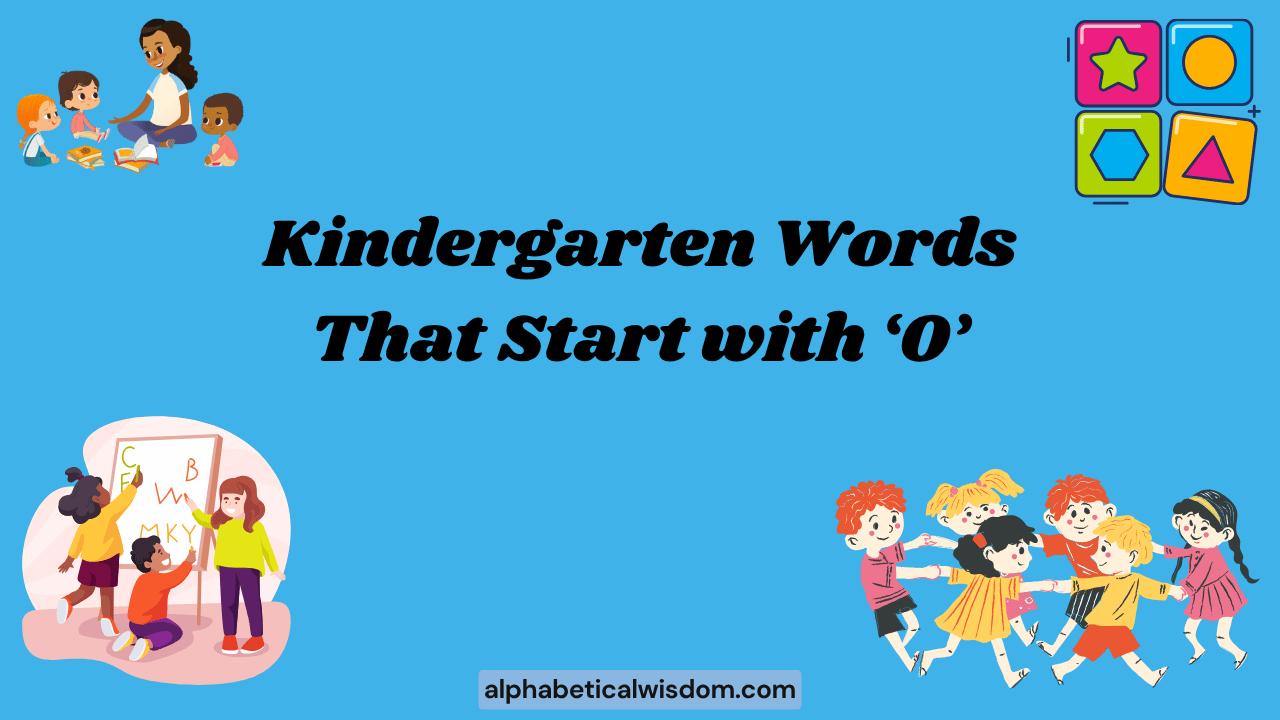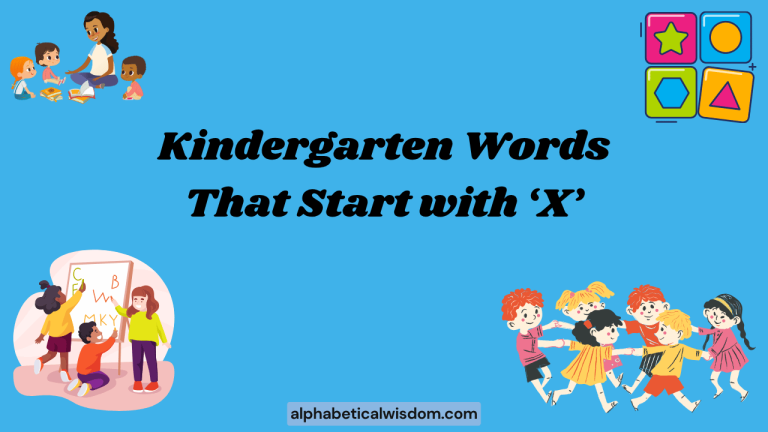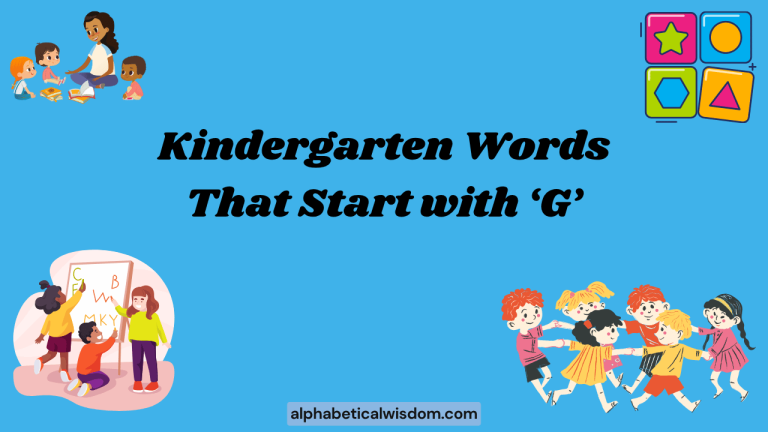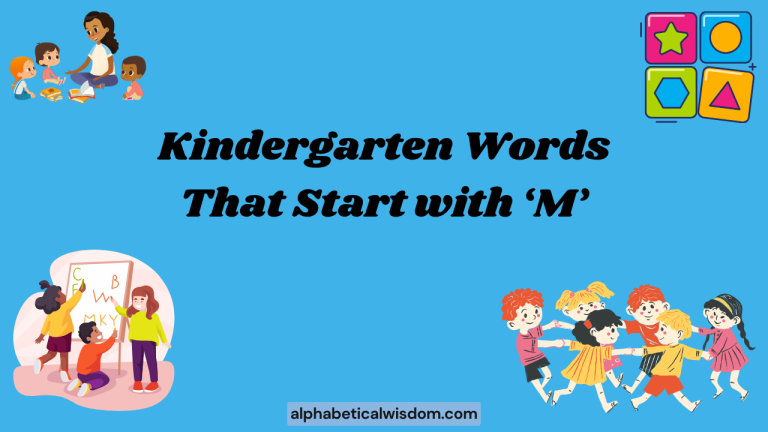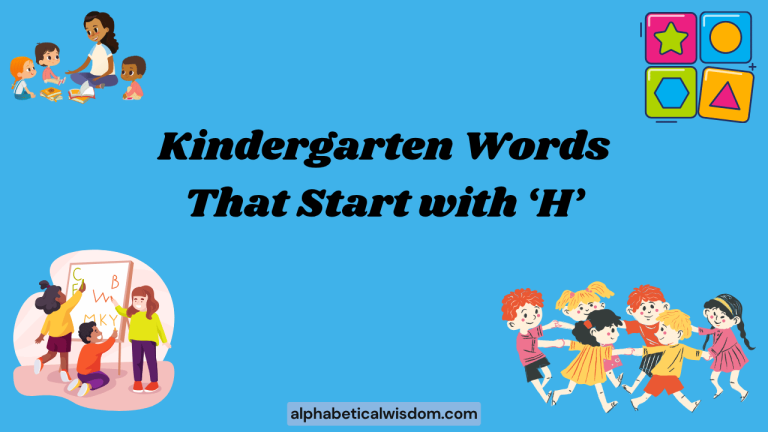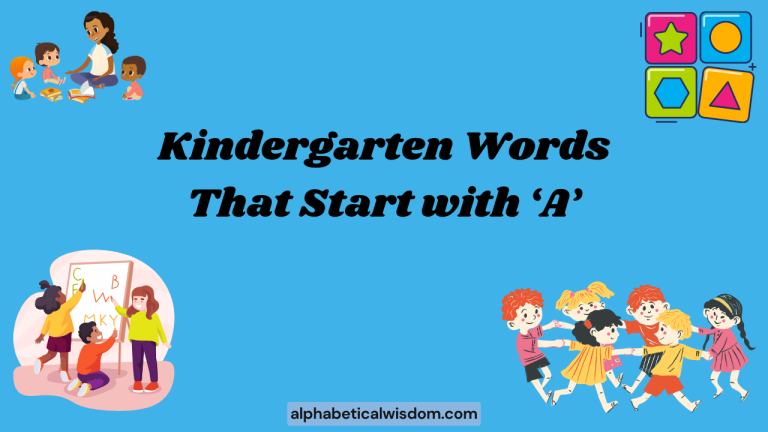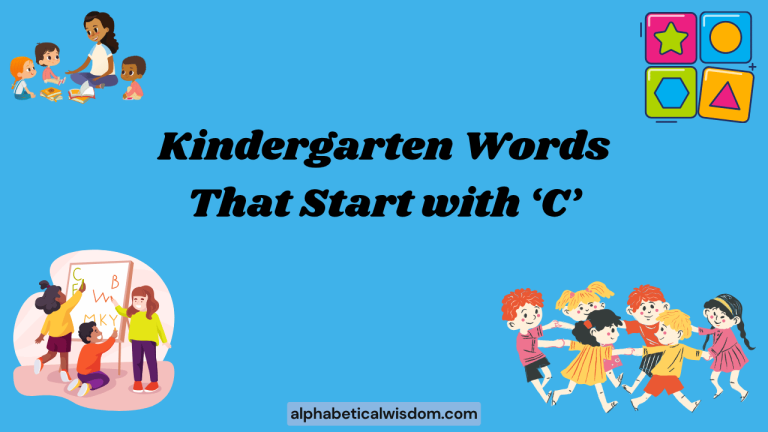Kindergarten Words That Start With O: A Comprehensive Guide
Learning new words is a fundamental part of a child’s early education, and focusing on words that begin with specific letters is a great way to build vocabulary and phonics skills. This article focuses on kindergarten-level words starting with the letter “O.” Mastering these words helps young learners improve their reading, writing, and communication abilities.
This guide is designed for parents, teachers, and homeschooling educators who want to provide engaging and effective vocabulary lessons for children aged 4-6. By exploring various examples, usage rules, and practice exercises, children can confidently expand their knowledge and application of “O” words.
Table of Contents
- Introduction
- Definition of Kindergarten Words Starting with ‘O’
- Structural Breakdown of ‘O’ Words
- Types and Categories of ‘O’ Words
- Examples of Kindergarten Words Starting with ‘O’
- Usage Rules for ‘O’ Words
- Common Mistakes with ‘O’ Words
- Practice Exercises
- Advanced Topics: Expanding Vocabulary
- Frequently Asked Questions
- Conclusion
Definition of Kindergarten Words Starting with ‘O’
Kindergarten words starting with the letter “O” are simple, age-appropriate terms that young children can easily understand and use. These words typically refer to familiar objects, animals, actions, or descriptive qualities.
The purpose of introducing these words is to build a foundational vocabulary that supports early literacy and communication skills. They serve as building blocks for more complex language development, allowing children to express themselves clearly and comprehend written and spoken language effectively.
These words are often phonetic, meaning their pronunciation closely matches their spelling, making them easier for children to decode and remember. For example, words like “orange” and “octopus” follow predictable phonetic patterns.
Understanding and using these words help children develop phonemic awareness, which is the ability to hear and manipulate the individual sounds in words. This skill is crucial for learning to read and spell.
Structural Breakdown of ‘O’ Words
The structural breakdown of “O” words for kindergarten involves understanding the basic phonetic pattern and common letter combinations. Most of these words consist of simple consonant-vowel-consonant (CVC) or consonant-vowel (CV) structures.
This simplicity helps children grasp the relationship between letters and sounds. For instance, the word “on” follows a CV pattern, while “ox” follows a VC pattern.
Understanding the initial “O” sound is also important. The letter “O” can produce different sounds depending on the word.
It can make a short “o” sound, as in “octopus,” or a long “o” sound, as in “oat.” Recognizing these variations helps children develop more accurate pronunciation and reading skills. Teachers often use visual aids and auditory exercises to reinforce these phonetic concepts.
Many kindergarten “O” words are also single-syllable words, which further simplifies their structure and makes them easier for children to pronounce and remember. Multi-syllable words, while less common, are still introduced at a basic level to expand vocabulary and prepare children for more advanced reading skills.
For example, the word “orange” has two syllables and introduces children to breaking down words into smaller parts.
Types and Categories of ‘O’ Words
Kindergarten words starting with “O” can be categorized based on their meaning and usage. This categorization helps children understand the different contexts in which these words can be used and expands their vocabulary in a structured way.
Here are some common categories:
Objects
These words refer to tangible items that children can see and interact with. Examples include “orange,” “oven,” and “ornament.”
Animals
This category includes names of animals that start with “O,” such as “octopus,” “owl,” and “ostrich.”
Actions
Action words, or verbs, describe activities or processes. Examples include “open,” “obey,” and “offer.”
Descriptive Words
These words, or adjectives, describe qualities or characteristics. Examples include “old,” “odd,” and “only.”
Examples of Kindergarten Words Starting with ‘O’
Providing numerous examples of kindergarten words starting with “O” is crucial for reinforcing learning and helping children understand how these words are used in different contexts. The following tables provide extensive lists of words categorized by type, along with example sentences to illustrate their usage.
Objects
This table provides examples of objects that start with the letter ‘O’, along with example sentences to illustrate their usage.
| Word | Example Sentence |
|---|---|
| Orange | I like to eat a juicy orange. |
| Oven | Mom is baking cookies in the oven. |
| Ornament | We hung a star ornament on the Christmas tree. |
| Oil | Dad uses oil to cook our dinner. |
| Olive | I put an olive on my pizza. |
| Onion | The onion made me cry when I cut it. |
| Office | My dad works in an office. |
| Outlet | Plug the lamp into the outlet. |
| Overcoat | I wear an overcoat when it’s cold outside. |
| Oar | We used an oar to row the boat. |
| Opera | My grandmother loves to listen to the opera. |
| Organ | The church had a beautiful organ. |
| Oboe | She plays the oboe in the orchestra. |
| Oblong | The table has an oblong shape. |
| Object | Can you identify the shining object? |
| Oculus | The building has a large oculus. |
| Octagon | A stop sign is shaped like an octagon. |
| Odometer | The odometer shows how far the car has traveled. |
| Offertory | The offertory was collected during the church service. |
| Opal | She wore a ring with an opal stone. |
| Orchard | We picked apples in the orchard. |
| Origami | She enjoys making origami animals. |
| Outpost | The soldiers guarded the outpost. |
| Outlet | There is an electric outlet near the desk. |
| Outlook | The outlook from the hill was beautiful. |
| Outing | We went on a family outing to the park. |
Animals
This table provides examples of animals that start with the letter ‘O’, along with example sentences to illustrate their usage.
| Word | Example Sentence |
|---|---|
| Octopus | An octopus has eight arms. |
| Owl | The owl hoots at night. |
| Ostrich | An ostrich is a very big bird. |
| Okapi | The okapi lives in the rainforest. |
| Oriole | The oriole sings a beautiful song. |
| Ox | The farmer uses an ox to plow the field. |
| Otter | The otter swam in the river. |
| Oryx | The oryx is a type of antelope. |
| Ocelot | The ocelot is a wild cat. |
| Old English Sheepdog | My neighbor has an Old English Sheepdog. |
| Olive Baboon | We saw an Olive Baboon at the zoo. |
| Onager | The Onager is a type of wild donkey. |
| Orange Tip Butterfly | An Orange Tip Butterfly visited the garden. |
| Ornate Hawk-eagle | The Ornate Hawk-eagle has beautiful feathers. |
| Ostrich Chick | The Ostrich Chick hatched from its egg. |
| Ostrich Plume Moth | The Ostrich Plume Moth is very small. |
| Owl Butterfly | The Owl Butterfly has spots that look like eyes. |
| Oyster | We ate oysters at the seafood restaurant. |
| Oranda | The Oranda is a type of goldfish. |
| Oscar Fish | The Oscar Fish is a popular aquarium pet. |
| Olive Sea Snake | The Olive Sea Snake lives in the ocean. |
| Olm | The Olm is a blind salamander. |
| Oilbird | The Oilbird lives in caves. |
| Opossum | An Opossum hung from the tree by its tail. |
Actions
This table provides examples of action words (verbs) that start with the letter ‘O’, along with example sentences to illustrate their usage.
| Word | Example Sentence |
|---|---|
| Open | Please open the door. |
| Obey | Children should obey their parents. |
| Offer | I will offer you some help. |
| Order | We will order pizza for dinner. |
| Organize | Let’s organize our toys. |
| Overcome | We can overcome any challenge. |
| Observe | Let’s observe the stars tonight. |
| Occupy | The students occupy their seats. |
| Offend | Try not to offend anyone with your words. |
| Operate | The doctor will operate on the patient. |
| Originate | The idea originated from a book. |
| Outdo | He tried to outdo his previous performance. |
| Outline | First, outline your essay. |
| Outlive | Some trees can outlive humans. |
| Outnumber | The birds outnumber the squirrels in the park. |
| Overeat | Try not to overeat during the holidays. |
| Overfly | The plane will overfly the city. |
| Overhear | I didn’t mean to overhear your conversation. |
| Overjoy | The good news will overjoy them. |
| Overlook | Don’t overlook any important details. |
| Oversee | The manager will oversee the project. |
| Overthrow | The rebels tried to overthrow the government. |
| Owe | I owe you an apology. |
| Own | I own a bicycle. |
Descriptive Words
This table provides examples of descriptive words (adjectives) that start with the letter ‘O’, along with example sentences to illustrate their usage.
| Word | Example Sentence |
|---|---|
| Old | My grandpa is very old. |
| Odd | That is an odd number. |
| Only | She is the only child. |
| Open | The store is open now. |
| Original | This is the original painting. |
| Ordinary | It was an ordinary day. |
| Outstanding | She gave an outstanding performance. |
| Outgoing | He is a very outgoing person. |
| Obedient | The dog is very obedient. |
| Official | This is the official document. |
| Ongoing | The project is still ongoing. |
| Optimal | The optimal solution is the best one. |
| Opulent | The palace was opulent. |
| Organic | These vegetables are organic. |
| Ornate | The building has ornate decorations. |
| Orthodox | They follow orthodox traditions. |
| Outlandish | He wore an outlandish outfit. |
| Outer | The outer layer protects the inner parts. |
| Overall | The overall result was positive. |
| Overcast | The sky is overcast today. |
| Overjoyed | She was overjoyed with the gift. |
| Overlapping | The circles are overlapping. |
| Overwhelming | The task seemed overwhelming. |
| Obese | The cat is quite obese. |
Usage Rules for ‘O’ Words
Understanding the usage rules for “O” words is essential for using them correctly in sentences. Here are some general guidelines:
- Nouns: Use nouns to name objects, animals, or places. For example, “I see an octopus in the ocean.”
- Verbs: Use verbs to describe actions. For example, “Please open the window.”
- Adjectives: Use adjectives to describe nouns. For example, “The old house is beautiful.”
It’s also important to pay attention to the context in which a word is used. Some words can have multiple meanings depending on the context.
For example, “open” can be a verb (to open a door) or an adjective (an open window).
For proper nouns (names of specific people, places, or things), remember to capitalize the first letter. While less common with “O” words at the kindergarten level, this is a fundamental rule to reinforce early on.
For instance, “Ohio” is a state name and should always be capitalized.
Common Mistakes with ‘O’ Words
Even with simple words, children can make common mistakes. Addressing these errors directly helps reinforce correct usage.
Here are some frequent mistakes with “O” words:
| Incorrect | Correct | Explanation |
|---|---|---|
| I see a octupus. | I see an octopus. | Using “an” before words that start with a vowel sound. |
| Open the dore. | Open the door. | Misspelling common words due to phonetic similarities. |
| The house is ould. | The house is old. | Confusing similar-sounding letters or letter combinations. |
| I obed my mom. | I obey my mom. | Misunderstanding the correct form of the verb. |
Another common mistake is using the wrong article (a/an) before words starting with “O.” Remember to use “an” before words that start with a vowel sound, even if the letter is a consonant. While “one” starts with “o,” it begins with a “w” sound, so it takes “a” (a one).
This can be tricky for young learners.
Practice Exercises
Practice exercises are essential for reinforcing learning and helping children apply their knowledge of “O” words. The following exercises are designed to test comprehension and usage in various contexts.
Exercise 1: Fill in the Blanks
Complete the following sentences with the correct “O” word from the word bank.
Word Bank: orange, open, old, octopus, owl
| Question | Answer |
|---|---|
| 1. Please _______ the door. | open |
| 2. An _______ has eight arms. | octopus |
| 3. My grandpa is very _______. | old |
| 4. I like to eat a juicy _______. | orange |
| 5. The _______ hoots at night. | owl |
| 6. The shop is _______ until 9 pm. | open |
| 7. He found an _______ coin in the garden. | old |
| 8. The _______ in the picture is colorful. | octopus |
| 9. She peeled the _______ carefully. | orange |
| 10. We heard an _______ in the forest. | owl |
Exercise 2: Matching
Match the “O” word to its correct definition.
| Word | Definition | Answer |
|---|---|---|
| 1. Orange | a. A bird that hunts at night | 1-c |
| 2. Open | b. Aged or advanced in years | 2-e |
| 3. Old | c. A citrus fruit | 3-b |
| 4. Octopus | d. To do what you are told | 4-f |
| 5. Obey | e. Not closed | 5-d |
| 6. Owl | f. A sea animal with eight arms | 6-a |
| 7. Offer | g. A building where people work | 7-i |
| 8. Office | h. To give or present something | 8-h |
| 9. Odd | i. Strange or unusual | 9-j |
| 10. Oven | j. A heated box for baking | 10-g |
Exercise 3: Sentence Completion
Complete each sentence using a word that starts with the letter “O”.
| Question | Answer |
|---|---|
| 1. The opposite of closed is _______. | open |
| 2. A fruit that is round and orange is an _______. | orange |
| 3. A very wise bird that hoots is an _______. | owl |
| 4. Something that is very _______ is strange. | odd |
| 5. A sea creature with eight arms is an _______. | octopus |
| 6. To follow rules and instructions is to _______. | obey |
| 7. When you provide help or assistance you _______ it. | offer |
| 8. Baking is often done in an _______. | oven |
| 9. A very _______ item is original. | old |
| 10. This is the _______ time I’ve asked you to clean your room. | only |
Advanced Topics: Expanding Vocabulary
Once children have mastered basic “O” words, you can introduce more complex vocabulary and concepts. This can include compound words (e.g., “overlook,” “outgrow”), words with multiple meanings (e.g., “object” as a noun and a verb), and words with less common phonetic patterns.
Encourage children to use these words in their writing and speaking to reinforce their understanding.
You can also explore the etymology of “O” words to deepen their understanding of language. For example, many “O” words have Greek or Latin roots, which can be fascinating for older kindergarteners.
Introducing prefixes and suffixes can also expand their vocabulary and help them decode new words.
Another advanced activity is to create stories or poems using as many “O” words as possible. This encourages creative thinking and helps children internalize the meaning and usage of these words in a fun and engaging way.
Consider incorporating visual aids, such as pictures or drawings, to further enhance their learning experience.
Frequently Asked Questions
- Why is it important to teach kindergarten words starting with “O”?
Teaching kindergarten words starting with “O” helps build foundational vocabulary, improves phonics skills, and supports early literacy development. These words provide building blocks for more complex language skills and empower children to express themselves effectively. It also helps children to recognize and differentiate vowel sounds.
- What are some effective strategies for teaching “O” words to kindergarteners?
Effective strategies include using visual aids (flashcards, pictures), incorporating hands-on activities (games, crafts), reading aloud, and providing plenty of repetition and practice. Multi-sensory approaches that engage different learning styles are particularly beneficial.
- How can I make learning “O” words fun and engaging?
You can make learning fun by incorporating games, songs, and stories that feature “O” words. Create interactive activities, such as word searches, matching games, and fill-in-the-blank exercises. Use positive reinforcement and celebrate progress to keep children motivated.
- What are some common challenges children face when learning “O” words?
Common challenges include confusing similar-sounding letters, misspelling words due to phonetic irregularities, and difficulty remembering the meanings of new words. Addressing these challenges with targeted instruction and practice can help children overcome these obstacles.
- How can I assess a child’s understanding of “O” words?
You can assess understanding through various methods, such as asking children to identify “O” words in a text, using them in sentences, or defining their meanings. Observation during activities and games can also provide valuable insights into their comprehension.
- Are there any specific resources or tools that can help with teaching “O” words?
Yes, there are many resources available, including flashcards, workbooks, online games, and educational apps. Websites and blogs dedicated to early childhood education often provide free printables and activity ideas. Libraries and bookstores also offer a wide range of age-appropriate books featuring “O” words.
- How can I incorporate “O” words into daily activities?
You can incorporate “O” words into daily activities by pointing out objects that start with “O,” reading books that feature these words, and encouraging children to use them in their conversations. Make it a habit to review “O” words regularly and provide opportunities for practice.
- What if a child is struggling to learn “O” words?
If a child is struggling, provide extra support and individualized instruction. Break down the words into smaller parts, use multi-sensory techniques, and offer plenty of encouragement. Consider consulting with a teacher or educational specialist for additional guidance.
- How can I extend learning beyond basic “O” words?
To extend learning, introduce more complex vocabulary, explore the etymology of words, and encourage children to use “O” words in their writing and speaking. Create stories and poems that feature these words and incorporate visual aids to enhance understanding.
- How do I explain the different sounds of the letter ‘O’ to a kindergartener?
Explain that the letter ‘O’ can make different sounds like in the word ‘octopus’ (short O sound) and ‘oat’ (long O sound). Use examples and repetition to help them differentiate between the sounds. You can also use hand gestures or visual aids to represent each sound.
- What are some good books for kindergarteners that focus on words starting with “O”?
Some great books include alphabet books that dedicate a page to the letter “O,” and storybooks that prominently feature objects or characters whose names begin with “O.” Look for books with colorful illustrations and simple, engaging text.
Conclusion
Mastering kindergarten words starting with the letter “O” is a crucial step in a child’s early literacy journey. By understanding the definitions, structures, and usage rules of these words, children can build a strong foundation for reading, writing, and communication.
The examples, exercises, and tips provided in this guide offer a comprehensive approach to teaching “O” words effectively.
Remember to make learning fun and engaging by incorporating games, stories, and hands-on activities. Encourage children to use “O” words in their daily conversations and provide plenty of opportunities for practice.
With patience, persistence, and the right resources, you can help children confidently expand their vocabulary and achieve their full potential in language development.
